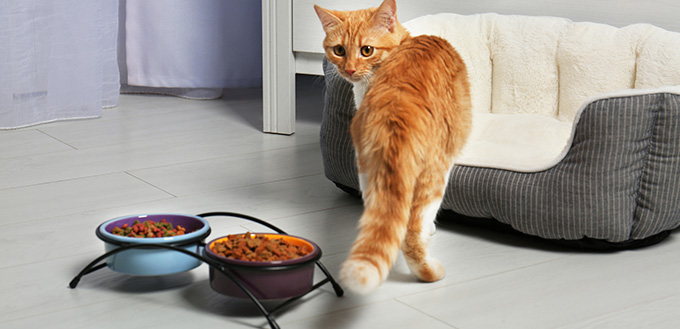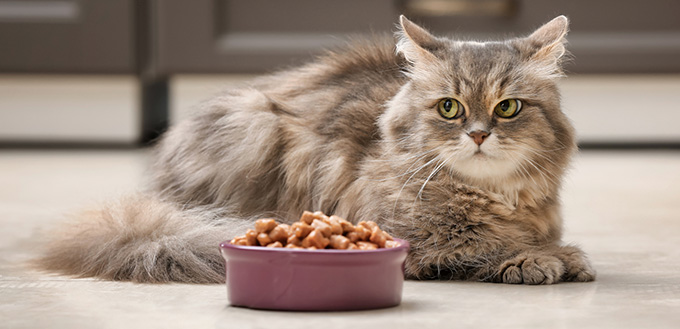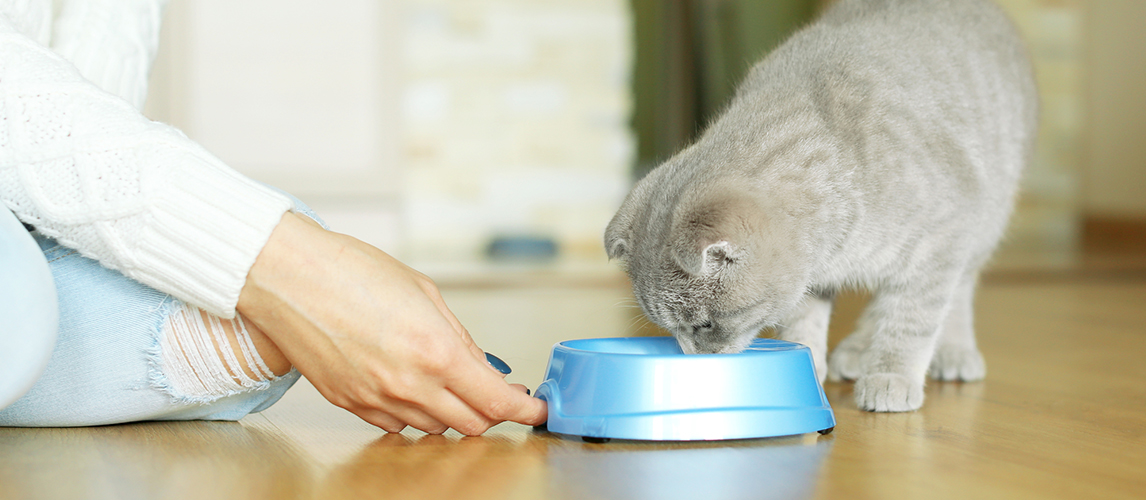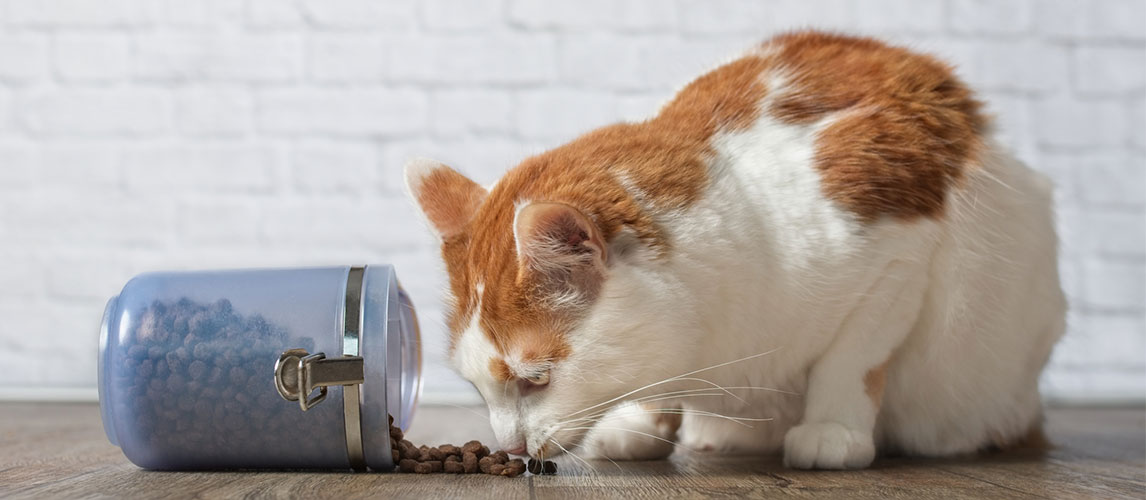People often discuss the difficulties of having finicky and fussy children who don’t eat their broccoli, apples and anything else that might be considered good for them, but have you ever come across a fussy pet? Most animals often have preferences, and, like humans, many pets love eating a lot of food that is not good for them. As cats don’t taste sweet flavors, they are less likely than dogs to be gluttonous towards unhealthy sugary foods, but they do have a reputation for having very discerning tastes. Is this a fair stereotype? Are cats often picky at dinner time?

Can Cats Be Fussy?
For most pets, fussiness often comes down to individual personality, and this is no different for your cat. One person might have a very adventurous cat who even expresses interest in your human food, but another person might have a cat that doesn’t seem to want to eat anything.
If your cat is fussy, it can be very worrying because it might seem like they have stopped eating. Most of the time, it is nothing to worry about if you can get them to eat something that they do like, but it is worthwhile looking into ways you can encourage them to eat, as we will outline below. If you are very worried or if your cat won’t eat anything at all, it is always beneficial to talk to a vet, particularly if you notice any other changes that could be symptoms of a broader issue.
Why Is My Cat Picky?
A common cause of pickiness in animals and humans is gluttony that is encouraged by offering too many treats. In hamsters, for example, it is unfortunately all too common for pet owners to accidentally provide a diet rich in grapes and other very sugary treats.
This can cause them to neglect their pellets or seeds, which are nutritionally essential, as they prefer a tasty, sugary diet. For all animals, treats should come after they have fully consumed their healthy and balanced diet.
Related Post: Best Cat Treats
Cats, however, are unlikely to have this specific cause of pickiness as they cannot taste sweet foods. Researchers discovered that one of the genes of the taste bud receptor that would recognize sweet flavors is not ‘switched on’ in cats as it is in humans. This explains their preference for protein, rather than carbohydrates.
This genetic influence over their tastes can affect your cat’s fussy behavior because many cat foods have a high proportion of grain in them, which does not have as much of a taste for them as meat. Generally, as cats are carnivores, the more protein in your cat food, the better.
Related Post: Grain Free Cat Food
Other important explanations for your cat’s fussy food habits include:
- What their mother ate during pregnancy and nursing
The nutrients that a kitten gets from their mother will affect what their body is used to and what they consider to be preferable. Take advice from a vet about feeding your pregnant cat to ensure you are supporting the development of her babies as best you can.
- If their diet as a kitten lacked variety
A kitten that was only fed one flavor, such as chicken, will not adjust well to trying beef, lamb or fish. Ensuring your kitten is used to variety is important to help them get all the nutrients that they need but it will make your life easier when you need to make changes to their diet. This might be for medical reasons, because your preferred brand is no longer available, or out of necessity if you are travelling or moving.
- If they are suffering from a medical condition
If your cat’s tastes inexplicably change, it can be a symptom of broader health issues. This could vary from pregnancy and old age to more serious issues with the mouth or digestion. Look out for any physical symptoms and other changes in their behavior, and, as always, if you are concerned you must take them to the vet.
Related Post: Cat Food for Older Cats

- Feelings of stress, fear or anxiety
Cats need to feel comfortable and at peace when they eat. If they feel under threat or anxious, they will not have much of an appetite. If you have ever owned both a cat and a dog, you have probably noticed this key difference between them, and it can be explained due to their preferred hunting methods. Cats hunt alone, and so eat alone at their leisure, while dogs are used to hunting as a pack and then fighting over the spoils.
- The size of the food pieces you are offering them
The design of your cat’s jaw means that they do not have the same side-to-side chewing action that we use to break down food. Like many carnivores, their teeth are primarily used for tearing off bite-sized chunks. Once food is in their mouth, they are likely to swallow it whole. If you provide pieces that are too big to swallow, but too small to bite into, your cat may not feel comfortable eating it.
Related Posts: Best Cat Toothbrush and Best Cat Toothpaste
Feeding a Fussy Cat
It can be very helpful to narrow down the cause of your cat’s fussiness if you want to do something about it. After all, if the cause is medical then treating the illness should hopefully restore their appetite. If you are unsure of the specific cause, here are some general tips to help you encourage them to eat more foods:
- Smell is important to cats. Try heating up the food to release more of an aroma, which can entice your cat to eat.
- Make sure they are eating in a stress-free environment without any other predators. They might want to be entirely alone, or may feel comforted if you stroke them while they eat.
- Try cutting the food smaller to make feeding as easy as possible. This may be a particular issue if you often home cook meals for your cat.
- Offer them a varied diet as early as possible. When choosing kitten foods, try out a range of brands and flavors. It is natural for your cat to have a preference out of these different foods, but don’t rely on just one. Find 3 to 5 that your cat likes and alternate between them.
- Create a feeding schedule and stick to it. An automatic pet feeder could really help you with that. Cat’s need stability and routine to feel safe and secure. Free-feeding can cause anxiety which will make it difficult for them to eat.
- Keep their feeding area very clean. Cats are clean animals that are sensitive to dirt and bad smells. They won’t want to eat in smelly old bowls or near any trash bags.
- Consider a professional behaviorist. They will have more experience finding the cause of your cat’s eating problems and can train them to fix their fussy habits.
Sources:
- Dr. H. Ellen Whiteley, How to Solve Cat Behavior Problems, HowStuffWorks
- Feeding Your Cat, Cornell University College of Veterinary Medicine





